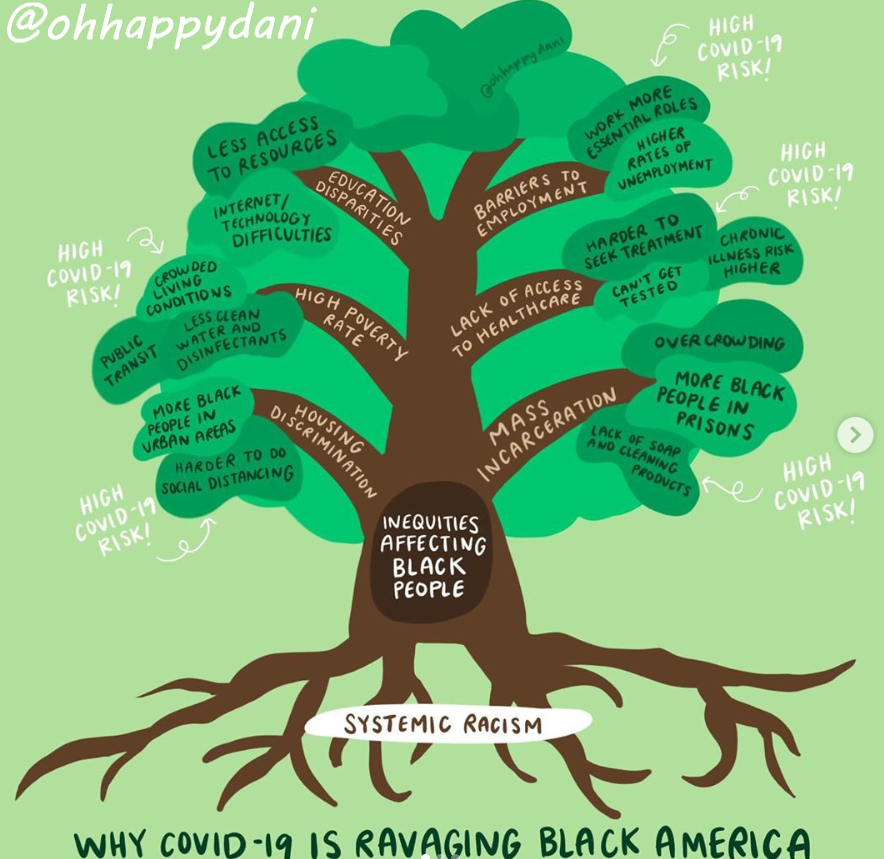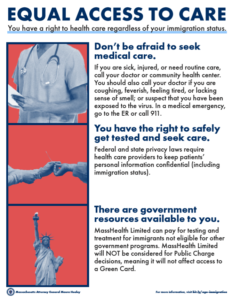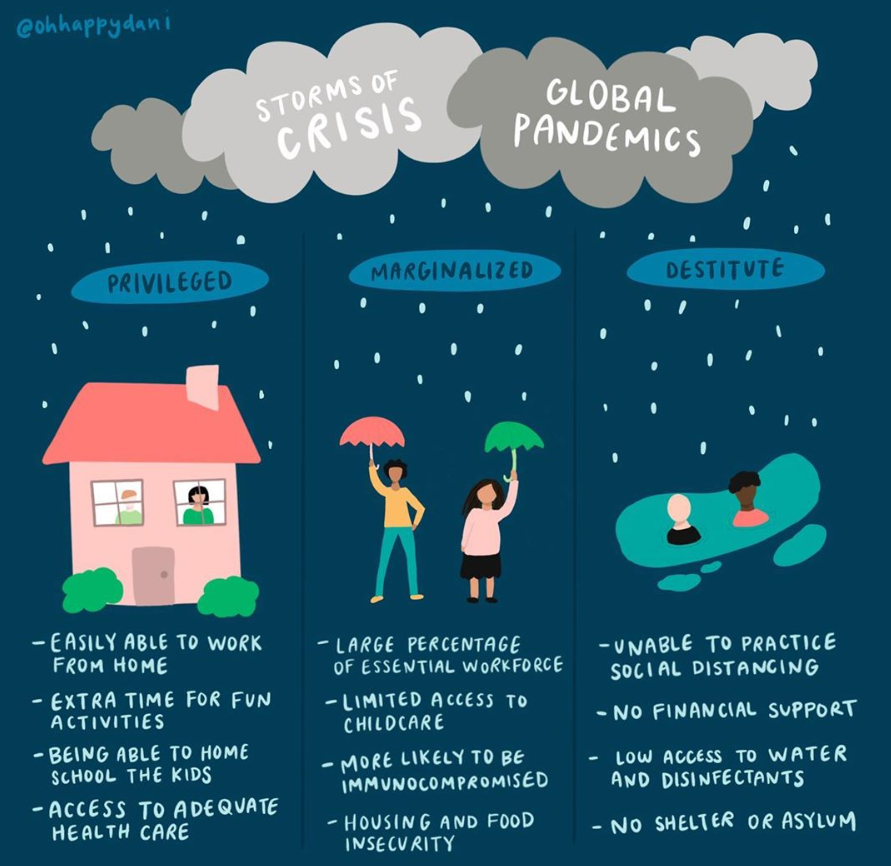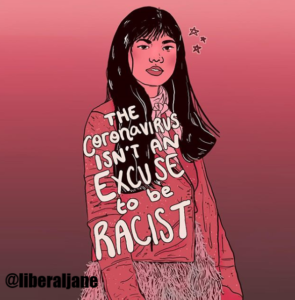 Introduction
Introduction
It is said that coronavirus doesn’t discriminate – across race, income, or geography. Yet, as the pandemic progresses, it has further exposed and aggravated many of the pre-existing inequities that exist in our society. In the U.S., racism is an underlying condition for COVID-19 infections and deaths, and profoundly impacts the social determinants of health – e.g., employment, housing, incarceration, income, and education, among others – by disproportionately burdening systemically disadvantaged communities including communities of color.
We are living in a moment when people increasingly recognize the value of public health. There is a growing awareness that equitable social policies – like paid sick leave, affordable and stable housing, fair economic policies, access to educational resources, and universal health care – strengthen the health of everyone. How can we use this moment to spotlight pervasive inequities, offer solutions, and envision a better way forward?
HRiA is committed to dismantling racism and advancing healthy equity through our conversations, our work, and our partnerships with communities. On this page, we offer curated evidence and resources to evaluate the crisis through a health and racial equity lens. We also highlight exemplary leadership addressing these inequities and invite you to take action. Each day, there are new data and stories of how COVID-19 is revealing societal inequities, so we hope this is the start, and for many, the continuation of much needed collective conversations and action – as we work together to protect the public’s health and advance equity.
Testing, treatment, and health outcomes

There is mounting evidence that communities of color are experiencing greater impacts from COVID-19. Data show that the virus is disproportionately impacting black people as well as Latinx and immigrant communities in the US. These inequities are attributed to the disproportionate presence of pre-existing chronic conditions facilitated by “environmental, economic, and political factors [that] have compounded for generations,” combined with lower access to testing centers and access to care. A key problem is a lack of access to translation and interpreter services. Non-English-speaking patients already have worse health outcomes for many routine procedures due to a lack of professional interpreter services, a problem further compounded by COVID-19. In addition, now that visitors are prohibited and in-person interpreters are limited, patients are left without advocates.
In Massachusetts, the City of Chelsea has emerged as a COVID-19 hotspot with the highest COVID-19 incidence rate. This community, with many Latinx working families and immigrants, many of whom are undocumented, is experiencing a high burden of illness.
Exemplary Leadership and Action Steps
Massachusetts Governor Charlie Baker recently announced a new initiative, in collaboration with Boston-based global health nonprofit Partners In Health (PIH), to accelerate the state’s efforts to contain the spread of COVID-19, by dramatically scaling up capacity for contact tracing. The new COVID-19 Community Tracing Collaborative (CTC) is designed to not just flatten the curve but bend it downward by rapidly reducing the number of cases in the state. PIH is coordinating with the MA COVID-19 Command Center, Commonwealth Health Insurance Connector Authority, and the Massachusetts Department of Public Health on this initiative.
Partnerships and collaborations among public health departments, community health workers (CHWs), health care institutions, schools of public health, and community-based organizations are critical to contain the virus’ spread. We also must expand the public health workforce focused on COVID-19, and we encourage leaders and lawmakers to mobilize existing trained workforces like the Medical Reserve Core, Americorp, social workers, and CHWs as part of their pandemic response plans. There are nearly 3,000 CHWs throughout Massachusetts. They are experienced in working in their communities, skilled in patient navigation and care coordination, and fluent in the languages and norms of the most affected people, including those with limited English proficiency and undocumented immigrants. They are trusted members of their communities who can collect the right data and match people with the resources that they need. Denise Octavia Smith, Executive Director for the National Association of Community Health Workers (NACHW), recently co-authored an opinion piece in Health Affairs calling for community leaders to leverage the strengths of the CHW workforce.
Take Action
Lack of racial/ethnic test data
 Racial and ethnic data are essential to understand which communities experience the greatest burdens of illness and death. While data from cities like New York, Detroit, New Orleans, Chicago, and Milwaukee illustrate clear disparities in COVID-19 infections and deaths, in Massachusetts, racial and ethnic data were available for less than one-third of COVID-19 deaths and positive tests. The absence of the collection and public reporting of racial and ethnic data will continue to perpetuate implicit biases and structural inequities. Encouragingly, Representatives Ayanna Pressley (MA) and Robin Kelly (IL)Senators Elizabeth Warren (MA), Kamala Harris (CA), and Cory Booker (NJ) have called on the U.S. Department of Health and Human Services to collect demographic data to identify and address ongoing disparities and health inequities.
Racial and ethnic data are essential to understand which communities experience the greatest burdens of illness and death. While data from cities like New York, Detroit, New Orleans, Chicago, and Milwaukee illustrate clear disparities in COVID-19 infections and deaths, in Massachusetts, racial and ethnic data were available for less than one-third of COVID-19 deaths and positive tests. The absence of the collection and public reporting of racial and ethnic data will continue to perpetuate implicit biases and structural inequities. Encouragingly, Representatives Ayanna Pressley (MA) and Robin Kelly (IL)Senators Elizabeth Warren (MA), Kamala Harris (CA), and Cory Booker (NJ) have called on the U.S. Department of Health and Human Services to collect demographic data to identify and address ongoing disparities and health inequities.Exemplary Leadership and Action Steps
In Chicago, Mayor Lori Lightfoot has moved aggressively to address the inequitable impact of COVID-19. In Milwaukee, where county leaders had declared racism a public health issue in 2019, data collection on coronavirus cases and deaths included race from the beginning of the pandemic, making it one of the few places in the US with more complete racial data.
Massachusetts is making strides in the right direction. On April 8, 2020, Governor Baker and Commissioner Bharel signed an Executive Order that health care providers should make every reasonable effort to collect race and ethnicity data for confirmed or suspected cases of COVID-19, and laboratories conducting tests for COVID-19 should report these data. As of April 26, 2020, the City of Boston is reporting race and ethnicity for about two-thirds of cases, but Massachusetts continues to report these data for less than half of cases. The Massachusetts Public Health Association’s (MPHA) COVID-19 Task Force’s has implored the Governor to improve data collection practices, provide greater transparency through disaggregated data, and monitor racial inequities in enforcement of public health orders. Presently, legislators are working on a bill to address COVID-19 data collection and treatment disparities that specifies data to be collected and how these data must be publicly reported. The MPHA COVID-19 Task Force sent comments on the bill to MA Senate President Karen Spilka on April 27th.
Take Action
- Read the letter to MA Governor Baker
- Sign up for the MPHA newsletter to keep up with the COVID-19 Equity Task Force
- Read the bill, An Act addressing COVID-19 data collection and disparities in treatment
- View the Massachusetts COVID-19 data dashboard
- Visit the COVID Racial Data Tracker
Ability to “socially distance”
 Stay-at-home orders have been an essential response to the COVID-19 pandemic. While many are now experiencing the challenges of working remotely, some workers don’t have that option. Dubbed a “white collar quarantine,” the ability to stay at home highlights inequities in employment and access to childcare, technology, living space, education, and healthcare. Data show that staying at home during this pandemic is a luxury unavailable to many low-income workers and workers of color who tend to have less job security and fewer benefits, and therefore greater susceptibility to getting sick.
Stay-at-home orders have been an essential response to the COVID-19 pandemic. While many are now experiencing the challenges of working remotely, some workers don’t have that option. Dubbed a “white collar quarantine,” the ability to stay at home highlights inequities in employment and access to childcare, technology, living space, education, and healthcare. Data show that staying at home during this pandemic is a luxury unavailable to many low-income workers and workers of color who tend to have less job security and fewer benefits, and therefore greater susceptibility to getting sick.Exemplary Leadership and Action Steps
HRiA has signed onto Trust for America’s Health (TFAH) action letter calling for paid sick leave for all workers. We also support the work of MPHA and the Raise Up Mass Coalition to advocate for paid sick leave time for all front line and essential workers, positions disproportionately held by women, people of color, and immigrants. MA legislators are currently working on the bill.
Take Action
- Read the letter to Vice President Pence and legislative leadership re: paid sick leave
- Review the TFAH Portal of COVID-19 Resources
- Read the bill, An Act relative to emergency paid sick time
Safe and healthy housing
 The ability to stay safe at home requires safe and stable shelter, and access to safe, stable, and affordable housing is vital to prevent the spread of the virus. Yet, our nation’s history of systemic discrimination in housing policy has created persistent inequities in homeownership, wealth, and racial segregation; these policies have facilitated the conditions for black residents and residents of color to be at greatest risk for being cost-burdened by housing, and having less stable and of poorer quality housing. Therefore, housing policy responses must consider these long-standing inequities that black and other communities of color face.
The ability to stay safe at home requires safe and stable shelter, and access to safe, stable, and affordable housing is vital to prevent the spread of the virus. Yet, our nation’s history of systemic discrimination in housing policy has created persistent inequities in homeownership, wealth, and racial segregation; these policies have facilitated the conditions for black residents and residents of color to be at greatest risk for being cost-burdened by housing, and having less stable and of poorer quality housing. Therefore, housing policy responses must consider these long-standing inequities that black and other communities of color face. Exemplary Leadership and Action Steps
On April 20, 2020, Governor Baker signed into law a housing security bill that put a moratorium on evictions and foreclosures as a result of strong advocacy from communities and the MPHA COVID-19 Task Force. Advocates in Massachusetts asked legislators to put a moratorium on all evictions and foreclosures including renters/owners who live in state- or federally-subsidized homes and homeowners who have federally-backed mortgages. This legislation also extends to ensuring access to safe quarantine for those experiencing homelessness (including LGBT homeless youth) and other congregate facilities. These two items are a part of the policy recommendations from the MPHA’s Health Equity and COVID-19 Task Force.
Take Action
- Read about the eviction moratorium bill recently signed by Governor Baker
- Learn more about the MPHA COVID-19 Equity Task Force’s policy areas
Access to economic stimulus
Exemplary Leadership and Action Steps
Congress is currently working to release an additional $350 billion in aid, and many are responding to the emerging needs in the community. The Boston Foundation (TBF) is offering workshops to help non-profits pursue these resources through the Small Business Administration. The United Way is supporting organizations seeking federal relief under the CARES Act by matching them with a volunteer who can provide guidance and help them apply for the PPP and Economic Injury Disaster Loan program. Meanwhile, a coalition of Massachusetts-based partners is supporting MA black and Latinx businesses by providing emergency funds.
Take Action
The following organizations are providing technical assistance for the PPP program:- Request one-on-one support from FMA
- Request one-on-one support from TSNE MissionWorks
- Request a volunteer from the United Way
Racist narratives, stigma, and bias
 Throughout history, epidemics and pandemics have been interwoven with language and policies that promote fear-mongering, othering, stigma, and anti-immigrant discrimination. COVID-19 is no exception. In the US, the xenophobic description of COVID-19 as a “Chinese virus” or the “Wuhan virus” has elevated deeply held racist tropes and stereotypes about people of Asian descent. This has led to an increase in overt racism and hate crimes against Asians and Asian Americans.
In addition, as we think about enforcement of shelter in place and social distancing guidance, we must consider how the increased powers of law enforcement might impact communities of color and exacerbate racial biases. With the recent CDC guidance to wear masks in public, increased incidents of racial profiling and police harassment against black men wearing protective face coverings have been documented.
Throughout history, epidemics and pandemics have been interwoven with language and policies that promote fear-mongering, othering, stigma, and anti-immigrant discrimination. COVID-19 is no exception. In the US, the xenophobic description of COVID-19 as a “Chinese virus” or the “Wuhan virus” has elevated deeply held racist tropes and stereotypes about people of Asian descent. This has led to an increase in overt racism and hate crimes against Asians and Asian Americans.
In addition, as we think about enforcement of shelter in place and social distancing guidance, we must consider how the increased powers of law enforcement might impact communities of color and exacerbate racial biases. With the recent CDC guidance to wear masks in public, increased incidents of racial profiling and police harassment against black men wearing protective face coverings have been documented.Exemplary Leadership and Action Steps
Calls to Action
References
Articles
- When Xenophobia Spreads Like A Virus (NPR, 3/4/20)
- The Rise of Coronavirus Hate Crimes (The New Yorker, 3/17/20)
- ‘White-Collar Quarantine’ Over Virus Spotlights Class Divide (New York Times, 3/27/20)
- Early Data Shows African Americans Have Contracted and Died of Coronavirus at an Alarming Rate (ProPublica, 4/3/20)
- Long-Standing Racial And Income Disparities Seen Creeping Into COVID-19 Care (Kaiser Health News, 4/6/20)
- Truth Be Told Podcast – ‘Rona and Racism: A Survival Guide (Podcast, 3/26/20)
- Hospitals Have Left Many COVID-19 Patients Who Don’t Speak English Alone, Confused and Without Proper Care (ProPublica, 3/31/20)
- Location Data Says It All: Staying at Home During Coronavirus Is a Luxury (NYT, 4/3/20)
- Commonwealth’s COVID-19 response leaves too many behind (CommonWealth Mag, 4/4/20)
- Coronavirus pandemic a perfect storm for LGBTQ homeless youth (NBC News, 4/5/20)
- Chicago mayor calls virus deaths in black community ‘devastating’ (PBS, 4/6/20)
- Chelsea, city of the working Latino immigrant, emerges as a COVID-19 hot spot. (Boston Globe, 4/7/20)
- State releases sparse coronavirus race and ethnicity data, making virus’s impact hard to assess (Boston Globe, 4/8/20)
- Outcry over racial data grows as coronavirus kills black Americans at disproportionate rate (The Globe and Mail, 4/8/20)
- With coronavirus, racism is the underlying condition (Boston Globe, 4/10/20)
- The Great American Rescue is leaving minority businesses behind (Boston Globe, 4/20/20)
- Minority-owned businesses are being left behind — again (Boston Globe, 4/21/20)
- Senators are demanding a solution to police stopping black men for wearing — and not wearing — masks (Vox.com, 4/22/20)
Web Resources
- 55 Organizations Call for Passage and Fast Implementation of Paid Sick Leave for all Workers as a Critical Part of COVID-19 Response (Trust for America’s Health)
- MPHA COVID-19 Task Force
- Business Equity COVID-19 Emergency Fund supporting black and Latinx businesses in Massachusetts
- Stop AAPI Hate from the Asian Pacific Policy and Planning Council
- Massachusetts COVID-19 data dashboard
PPP Technical Assistance
Legislation
- Order of the Commissioner of Public Health (Mass.gov, 4/8/20)
- An Act relative to emergency paid sick time
- An Act providing for a moratorium on evictions and foreclosures during the COVID-19 Emergency
Letters
- Letter to HHS re: racial disparities in COVID response (3/27/20)
- Letter to MA Governor Baker re: need for public data and action plan on inequities in COVID-19 impact (MPHA COVID-19 Task Force, 4/17/20)
Artists
- Danielle Coke (@ohhappydani)
- Caitlin Blunnie (@liberaljane)
Articles
- When Xenophobia Spreads Like A Virus (NPR, 3/4/20)
- The Rise of Coronavirus Hate Crimes (The New Yorker, 3/17/20)
- ‘White-Collar Quarantine’ Over Virus Spotlights Class Divide (New York Times, 3/27/20)
- Early Data Shows African Americans Have Contracted and Died of Coronavirus at an Alarming Rate (ProPublica, 4/3/20)
- Long-Standing Racial And Income Disparities Seen Creeping Into COVID-19 Care (Kaiser Health News, 4/6/20)
- Truth Be Told Podcast – ‘Rona and Racism: A Survival Guide (Podcast, 3/26/20)
- Hospitals Have Left Many COVID-19 Patients Who Don’t Speak English Alone, Confused and Without Proper Care (ProPublica, 3/31/20)
- Location Data Says It All: Staying at Home During Coronavirus Is a Luxury (NYT, 4/3/20)
- Commonwealth’s COVID-19 response leaves too many behind (CommonWealth Mag, 4/4/20)
- Coronavirus pandemic a perfect storm for LGBTQ homeless youth (NBC News, 4/5/20)
- Chicago mayor calls virus deaths in black community ‘devastating’ (PBS, 4/6/20)
- Chelsea, city of the working Latino immigrant, emerges as a COVID-19 hot spot. (Boston Globe, 4/7/20)
- State releases sparse coronavirus race and ethnicity data, making virus’s impact hard to assess (Boston Globe, 4/8/20)
- Outcry over racial data grows as coronavirus kills black Americans at disproportionate rate (The Globe and Mail, 4/8/20)
- With coronavirus, racism is the underlying condition (Boston Globe, 4/10/20)
- The Great American Rescue is leaving minority businesses behind (Boston Globe, 4/20/20)
- Minority-owned businesses are being left behind — again (Boston Globe, 4/21/20)
- Senators are demanding a solution to police stopping black men for wearing — and not wearing — masks (Vox.com, 4/22/20)
Web Resources
- 55 Organizations Call for Passage and Fast Implementation of Paid Sick Leave for all Workers as a Critical Part of COVID-19 Response (Trust for America’s Health)
- MPHA COVID-19 Task Force
- Business Equity COVID-19 Emergency Fund supporting black and Latinx businesses in Massachusetts
- Stop AAPI Hate from the Asian Pacific Policy and Planning Council
- Massachusetts COVID-19 data dashboard
PPP Technical Assistance
Legislation
- Order of the Commissioner of Public Health (Mass.gov, 4/8/20)
- An Act relative to emergency paid sick time
- An Act providing for a moratorium on evictions and foreclosures during the COVID-19 Emergency
Letters
- Letter to HHS re: racial disparities in COVID response (3/27/20)
- Letter to MA Governor Baker re: need for public data and action plan on inequities in COVID-19 impact (MPHA COVID-19 Task Force, 4/17/20)
Artists
- Danielle Coke (@ohhappydani)
- Caitlin Blunnie (@liberaljane)

